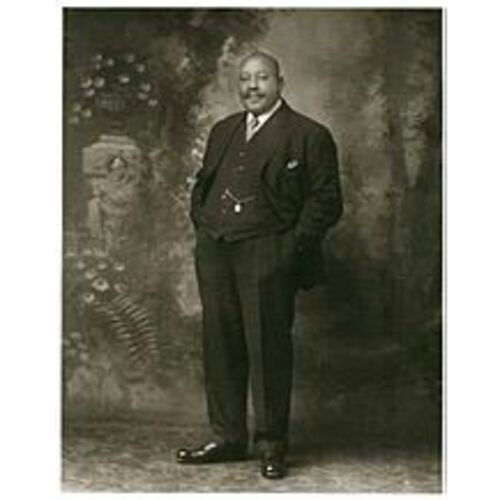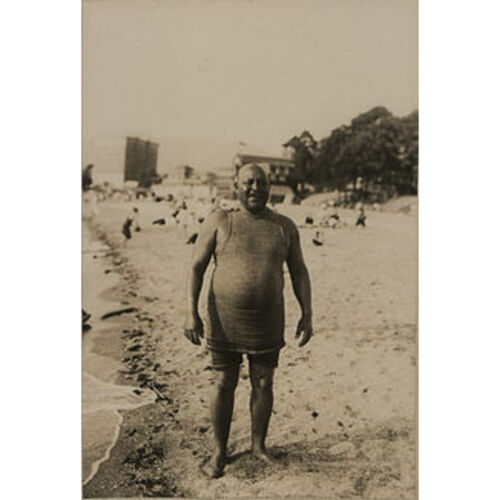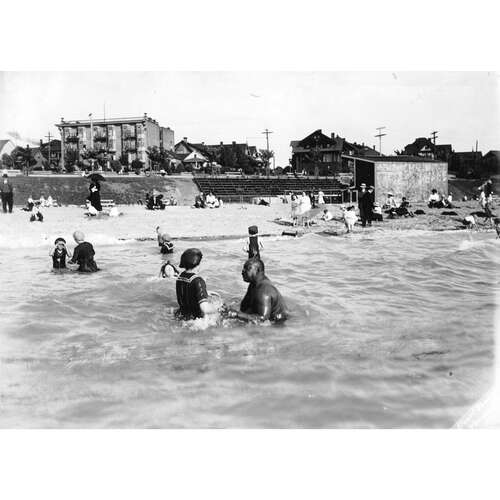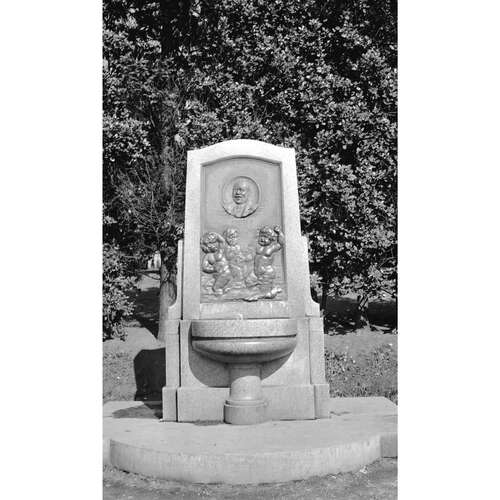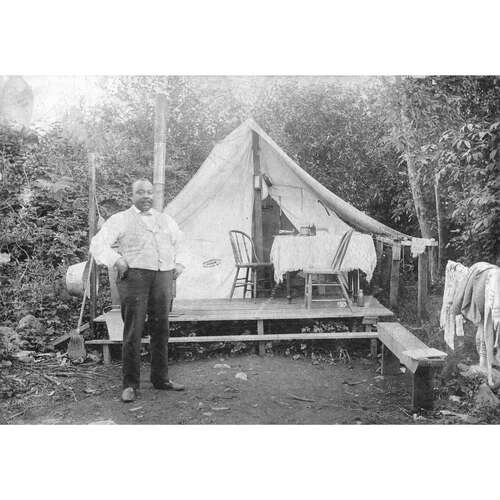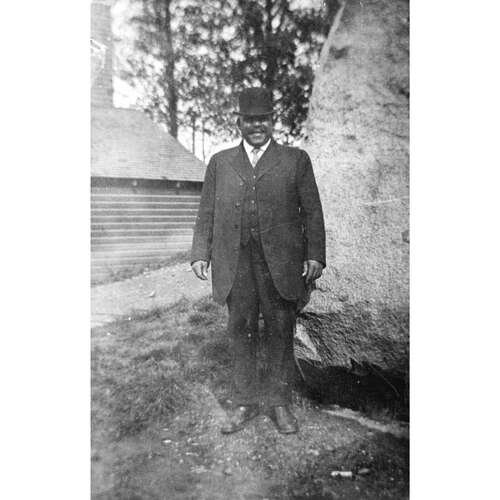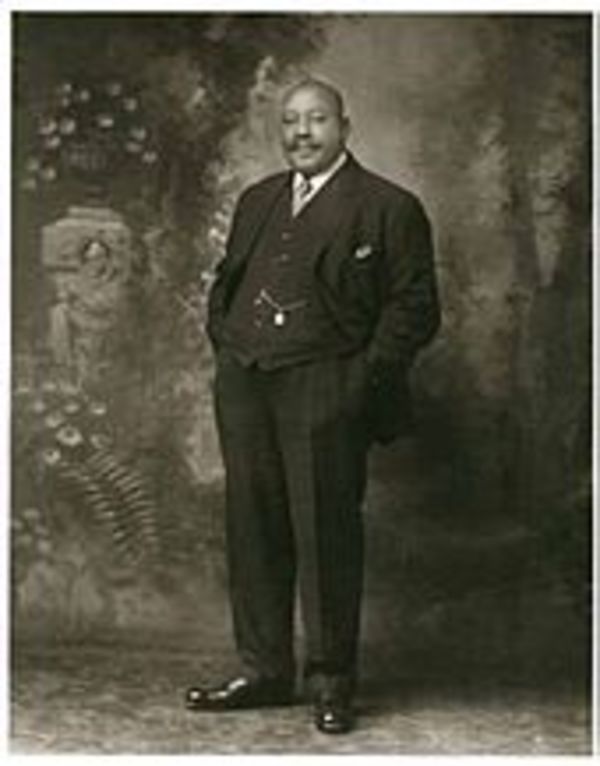
Source: Courtesy of Wikimedia Commons
FORTES, JOSEPH SERAPHIM, shoeblack, bartender, porter, swimming instructor, and lifeguard; b. 9 Feb. 1863 in Port of Spain (Republic of Trinidad and Tobago); d. unmarried 4 Feb. 1922 in Vancouver.
Some sources give Joe Fortes’s birthplace as Barbados, but an autobiographical article in the Vancouver Daily News-Advertiser states that he was born in Port of Spain. According to another source, his father was a Barbadian “of full African blood” and his mother was “entirely or largely” Spanish or Portuguese; the 1901 census for Vancouver lists him as Trinidadian and Spanish speaking.
At 17 Fortes left Trinidad for England. Residing for five years in Liverpool, he learned to swim at St George’s Baths, where he became a swimmer and diver of some note. He won a three-mile race across the Mersey River, received a gold medal for life-saving, and exhibited his talents as part of an 11-person swim team in a tour of English and French seaside resorts.
Fortes came to Granville (Vancouver) on the Robert Kerr, debarking on 30 Sept. 1885. The town was booming because of the lumber industry and its designation as a railway terminus [see Malcolm Alexander MacLean*]. People moved from Vancouver Island to the mainland in search of jobs, and a number of blacks came as well from eastern Canada, Alberta, the Pacific northwest, the West Indies, and even further afield. Consequently, the centre of British Columbia’s African Canadian community changed from Victoria to Vancouver as the century drew to a close. Most members of the black population there, which never numbered more than around 300, lived mainly in what became known as Strathcona or the East End.
For eight months, until the great fire of June 1886, Fortes ran Vancouver’s earliest shoeshine stand, in the Sunnyside Hotel on Water Street. Afterwards he worked as a bartender and porter at such local establishments as the Bodega Saloon on Carrall Street in Strathcona and the Alhambra Hotel at the corner of Carrall and Water. Known to be clean, sober, and an expert mixer of cocktails, he was most famous, however, for his volunteer work as a swimming instructor and lifeguard. He was a common sight at English Bay beach, where he taught thousands of children to swim. It was not until around 1897 that the city, in recognition of his services, put him on its payroll as a lifeguard; at some point he was also made a special police constable. He reputedly saved more than 100 people from drowning, including many children and several adults, among them John Hugo Ross, who would die in the sinking of the Titanic. In 1905 his cottage was moved from the foot of Gilford Street to the bank above the beach. Apparently he had no family in the city, but his friend Noel Robinson would state in an obituary that Joe had “a sister in Toronto with whom he corresponded.” He certainly earned the respect of countless parents and children.
Fortes died in the Vancouver General Hospital in 1922. It was thought that he had had pneumonia that developed into mumps, but in the end he had a stroke. The city honoured him by arranging the largest public funeral ever held there. Thousands of people, including the mayor, several aldermen, the chief of police, constables, and many ordinary citizens, attended the service at Our Lady of the Holy Rosary Cathedral, and a moment of silence was held in the city’s schools. In his memory, $5,000 was raised to erect a water fountain, designed by Vancouver sculptor Charles Marega. Standing in Alexandra Park near the beach he once patrolled, it is simply inscribed “Little children loved him.”
BCA, GR-2951, no.1922-09-302410 (mfm.). City of Vancouver Arch., Add. mss 35 (Robert Kerr fonds); Add. mss 54 (J. S. Matthews coll.), newspaper clippings, Joe Fortes (M3265); topical files, Joe Fortes, (01558); Add. mss 786 (Alan Morley fonds); Vancouver Health Dept. fonds, ser.152 (Mountain View Cemetery reg.), MCR 15-26, vol.19: 33–34 (mfm.). NA, RG 31, C1, 1901, Vancouver, dist.16: 2. Daily News-Advertiser (Vancouver), 19 Jan. 1913. Vancouver Daily Province, 16 June 1920. Michael Kluckner, Vancouver: the way it was (Vancouver, 1984).
Cite This Article
Sherry Edmunds-Flett, “FORTES, JOSEPH SERAPHIM,” in Dictionary of Canadian Biography, vol. 15, University of Toronto/Université Laval, 2003–, accessed April 1, 2025, https://www.biographi.ca/en/bio/fortes_joseph_seraphim_15E.html.
The citation above shows the format for footnotes and endnotes according to the Chicago manual of style (16th edition). Information to be used in other citation formats:
| Permalink: | https://www.biographi.ca/en/bio/fortes_joseph_seraphim_15E.html |
| Author of Article: | Sherry Edmunds-Flett |
| Title of Article: | FORTES, JOSEPH SERAPHIM |
| Publication Name: | Dictionary of Canadian Biography, vol. 15 |
| Publisher: | University of Toronto/Université Laval |
| Year of revision: | 2005 |
| Access Date: | April 1, 2025 |


